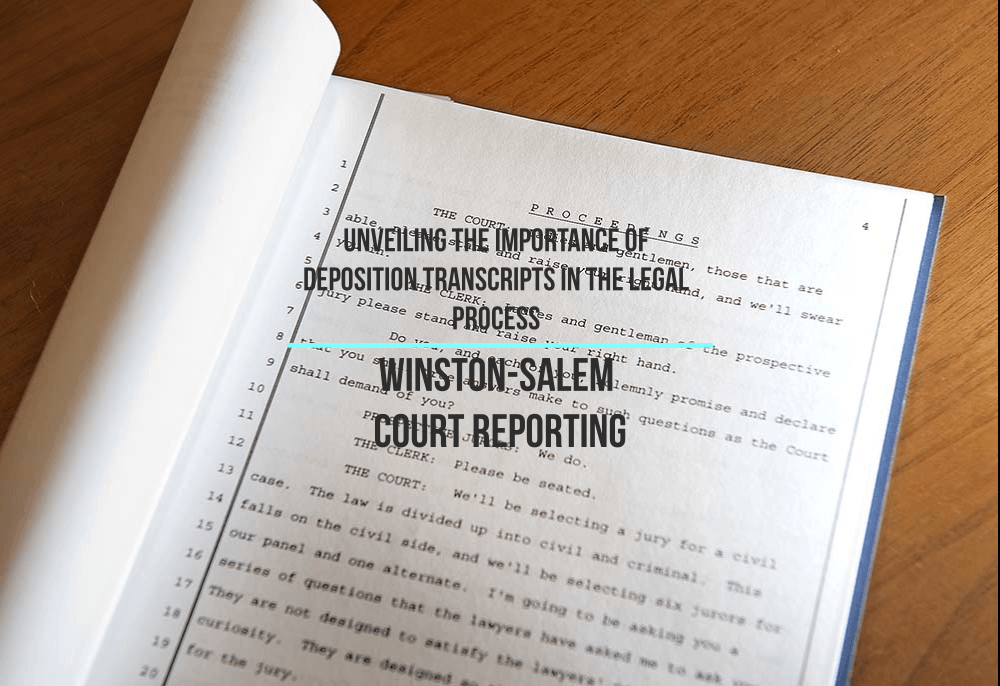Month: May 2023
Exploring Different Types of Court Reporting

Court reporting plays a crucial role in the legal system, ensuring an accurate and verbatim record of proceedings. While court reporters are often associated with traditional courtroom trials, their expertise extends beyond that. In this blog post, we will explore different types of court reporting, including depositions, trials, hearings, and more, highlighting their unique characteristics and the role of court reporters in each setting.
1. Depositions: Unveiling Witness Testimonies
Depositions are out-of-court testimonies given under oath, typically held in an attorney’s office or a neutral location. Court reporters play a vital role in capturing the witness’s words during the deposition. These transcripts are invaluable during case preparation, discovery, and trial, allowing attorneys to examine witness statements, identify inconsistencies, and develop effective legal strategies.
2. Trials: Documenting Courtroom Proceedings
Courtroom trials are perhaps the most well-known setting for court reporters. They are responsible for creating a real-time, verbatim record of every word spoken during the trial. By using stenographic machines or other advanced recording technologies, court reporters ensure the accuracy and integrity of the trial proceedings. Their transcripts become crucial references for judges, attorneys, and other parties involved in the case.
3. Hearings: Recording Administrative Proceedings
Hearings, often conducted by administrative bodies or agencies, involve the presentation of evidence and arguments on specific issues. Court reporters accurately capture all spoken interactions, testimonies, and evidentiary proceedings during administrative hearings. These transcripts serve as an official record of the hearing and may be referred to during subsequent appeals or other legal processes.
4. Arbitrations: Capturing Alternative Dispute Resolution Proceedings
Arbitrations are alternative dispute resolution processes where parties present their cases before an arbitrator or a panel of arbitrators. Court reporters play a vital role in accurately documenting the proceedings, ensuring that all statements, evidence, and arguments are recorded for future reference. The resulting transcripts provide an official record of the arbitration process and can be crucial for any potential legal challenges.
Court reporters are instrumental in capturing and preserving the spoken word in various legal settings. From depositions and trials to hearings, and arbitrations, their expertise ensures that an accurate, verbatim record is maintained. Understanding the different types of court reporting highlights the essential role court reporters play in the legal system, providing a reliable record of proceedings that is vital for the pursuit of justice.
To book your next deposition, please call our office at (336) 923-7429 or click here to book now!
The Different Types of Video Depositions

There are several options available for video depositions that can be tailored to your specific needs. Here are some alternatives you can consider:
In-Person Video Deposition:
Conducted face-to-face, this type of deposition captures the witness’s testimony while they are physically present in the deposition room. The entire proceeding is recorded on video.
Remote Video Deposition:
This option allows for the deposition to take place remotely, with the witness and attorneys participating from different locations. Videoconferencing platforms, such as Zoom, facilitate the virtual interaction and recording of the witness’s testimony. This approach offers convenience and cost savings by eliminating the need for travel.
Picture-in-Picture Deposition:
Similar to a remote video deposition, this format includes an additional feature where the witness’s image is displayed within a smaller window, simultaneously with the larger image, video, or document being presented. This setup enhances visual context and provides a more comprehensive recording of the proceedings.
Day-in-the-Life Video Deposition:
Primarily used to document an individual’s daily activities following an injury or accident, this type of deposition captures the witness going through their routine. The recorded footage serves as evidence that can be presented during a trial to illustrate the impact of the incident on the person’s life.
Hybrid Video Deposition:
Hybrid video depositions offer a flexible and innovative approach to conducting legal proceedings. In this format, some participants attend the deposition in person at a designated location, while others join remotely via Zoom or other video conferencing platforms. This combination allows for face-to-face interactions among certain individuals, while accommodating the convenience and cost-saving benefits of remote attendance for others. Hybrid Zoom video depositions provide the opportunity to leverage the advantages of both in-person and remote depositions, ensuring effective communication and collaboration while adapting to various logistical considerations. This hybrid approach is particularly useful in situations where participants are located in different geographical areas or face travel constraints, enabling seamless integration of diverse perspectives and maximizing efficiency in the deposition process.
By considering these various options, you can select the most appropriate type of video deposition that aligns with your specific requirements. Whether you opt for an in-person or remote format, or choose to incorporate additional visual elements, leveraging these options will allow you to obtain the precise outcome you seek.
Unveiling the Importance of Deposition Transcripts in the Legal Process

Depositions are a critical component of the legal process, allowing attorneys to gather sworn testimony from witnesses and build their cases. During these proceedings, accurate and comprehensive deposition transcripts are invaluable assets. In this blog, we will explore the significance of deposition transcripts and shed light on how they shape legal proceedings and facilitate effective case preparation.
1. A record that cannot be changed.
Deposition transcripts serve as an immutable record of the testimony provided by witnesses. They capture the exact words spoken under oath, preserving the intricacies of the deposition process. These transcripts are a vital resource for attorneys as they review and analyze witness statements, identify inconsistencies or contradictions, and develop their strategies accordingly. The precision and accuracy of deposition transcripts play a crucial role in ensuring justice and fairness within the legal system.
2. Essential Discovery Tool
Deposition transcripts are an essential tool during the discovery phase of a case. Attorneys use these transcripts to gain valuable insights into the opposing party’s position, strengthen their arguments, and uncover potential evidence. By carefully studying the deposition transcripts, attorneys can identify key points and use them to challenge witnesses during cross-examinations or support their own witnesses’ testimonies. These transcripts are invaluable for developing a comprehensive understanding of the case and formulating effective legal strategies.
3. Building a Strong Case
Deposition transcripts provide attorneys with a wealth of information to build a strong and persuasive case. By reviewing witness statements, attorneys can identify favorable or damaging testimony that can significantly impact the outcome of the case. The transcripts allow them to meticulously prepare for trial, highlighting inconsistencies, contradictions, or credibility issues that can be used to challenge opposing witnesses or support their own client’s version of events. A well-prepared attorney armed with thorough deposition transcripts can present a compelling case and navigate the complexities of the legal process with confidence.
4. Collaborative Case Preparation
Deposition transcripts facilitate collaborative case preparation among legal teams. Attorneys can share and discuss deposition transcripts with colleagues, paralegals, and experts to gain different perspectives and insights. These transcripts serve as a foundation for discussions and strategic planning, allowing the legal team to collectively analyze and interpret the information contained within them. Such collaboration enhances the overall quality of case preparation and helps ensure that all aspects of the case are thoroughly examined.
5. Documentation for Future Reference
Deposition transcripts also serve as valuable documentation for future reference. Attorneys can refer back to these transcripts during trial, redirecting witnesses or refreshing their memory on specific points raised during depositions. Furthermore, deposition transcripts can be used for post-trial analysis, appeals, or any subsequent legal proceedings. They serve as a permanent and reliable source of information, allowing attorneys to revisit witness testimony accurately and effectively.
Deposition transcripts are an integral part of the legal process, providing a verbatim account of witness testimony that can shape the outcome of a case. They serve as a crucial resource for attorneys during case preparation, discovery, and trial, enabling them to build strong arguments, challenge witnesses, and craft persuasive narratives. The accuracy, comprehensiveness, and accessibility of deposition transcripts contribute significantly to the pursuit of justice and the smooth functioning of the legal system.